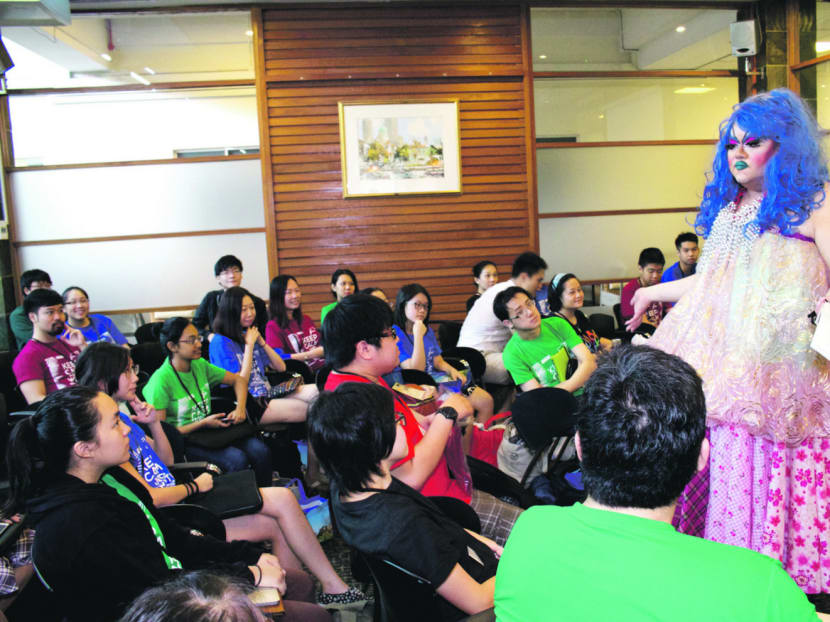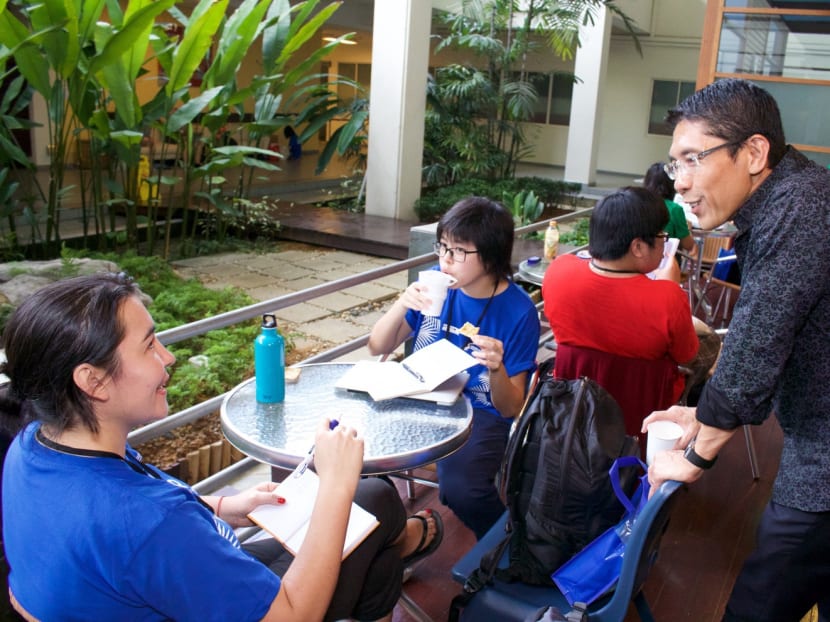Write of passage at IMH
SINGAPORE — Stepping inside the lobby of the Institute of Mental Health (IMH), I was filled with a sense of adventure. The taxi driver who dropped us off recounted that decades ago, the old Woodbridge Hospital felt ominous with its prison-like gates. In contrast, the IMH of today is contemporary and even resort-like — even the restrooms. Although it seems like other government hospitals, there was more greenery and resting spaces, and it felt more tranquil.


SINGAPORE — Stepping inside the lobby of the Institute of Mental Health (IMH), I was filled with a sense of adventure. The taxi driver who dropped us off recounted that decades ago, the old Woodbridge Hospital felt ominous with its prison-like gates. In contrast, the IMH of today is contemporary and even resort-like — even the restrooms. Although it seems like other government hospitals, there was more greenery and resting spaces, and it felt more tranquil.
My friend and I were about to check in and call it home — at least for the next 24 hours. We were participating in TheatreWorks’ annual 24-Hour Playwriting Competition, which was held over the weekend. Organised by TheatreWorks Writers’ Laboratory Writing & Community, in partnership with the South East Community Development Council, the winner from this year’s competition will have his or her winning play developed by theatre professionals into a full production, which will be taken on a performance tour to the South East District in the first quarter of 2016.
Why have a competition at the IMH? The event, now on its 18th edition, is held at unusual venues to inspire budding playwrights. Last year’s venue, for example, was at the Malay Heritage Centre.
We were housed at the main block and can only sign out for short breaks for up to 20 minutes. Our “free roam” area included the seminar rooms and an alfresco wooden deck surrounded by a koi pond and lush plants. There were 85 of us taking part in the youth and open categories, with the youngest aged 15 and the oldest at 49. As I scanned my competitors in the hall, I was relieved this was not a last-person-standing event a la the Hunger Games-style.
To help us with our writing, our colourful, larger-than-life Gamemaster, popular drag queen Becca D’Bus, reminded us that five stimuli would be given throughout the competition, and they had to be incorporated in the given sequence. Our first one was delivered by none other than Dr Maliki Osman, Minister of State, Ministry of National Development & Ministry of Defence, and Mayor of South East Community Development Council, who dramatically unveiled it: On his shirt were the words “Boss, the time has come”. The phrase was to be the first line of dialogue for the plays we were to write and questions flew while some started furiously typing on their keyboards.
The first eight hours (from Saturday afternoon until midnight) were the most enjoyable and breezy, as I developed scenes for my first act and made friends over meals. Although the patient wards were out of bounds to competitors, I explored the cafeteria and wandered into the Woodbridge Museum on the second level, where they had artefacts such as a large model of the original hospital made by patients in the early 1970s; a straitjacket used to strap inmates down; and surgical instruments used to carry out post-mortems during the Japanese Occupation when the hospital was used by the military. Having the museum all to myself, I perused the exhibits and flinched at some of the treatments done to patients in the early days. Originally known as the New Lunatic Asylum in 1925, it was renamed Woodbridge Hospital in 1951 and, eventually, IMH.
An IMH staff shared an anecdote that she frequently received requests for a loan of strait jackets for productions. However, the strait jacket has long been in disuse, thanks to modern rehabilitative measures. The fact that such a dated symbol is still often used to depict mental illness — in stories and productions — illustrates our lack of understanding. Perhaps playwrights can bridge that gap by debunking some of the myths, and doing justice to characters with mental illness, beyond a plot device.
I also attended a talk by Chan Li Shan, an inspiring IMH advocate who shared her journey with schizophrenia. Her deeply personal story debunked misconceptions and enlightened us that mental illness can happen to anyone, and with treatment, patients can recover and reclaim their lives and dreams.
I strolled along the hospital corridors and browsed (closed) gift shop windows that displayed beautiful pottery pieces by the patients. There was a beautiful watercolour painting of the Singapore River by a long-stay patient and I marvelled at the art he created — while I struggled with my script.
Coffee breaks were aplenty and I chatted with a manager who chose to attend the event instead of a Chartered Financial Analyst module; and another who planned to rush back to the office after the gruelling 24 hours was up. It was heartening to see others who cherished this passion for writing and the arts, no matter where we came from.
The next eight hours (from midnight until morning) were the most physically challenging. After many cups of coffee, strolls, rolls and attempts to stay awake, I decided to sleep at 2am. But seconds after I tucked into my sleeping bag, a gregarious snoring started, the kind that sounds like Thor repeatedly striking us with his hammer. I rolled up my sleeping bag and slept beside the Koi pond, but found it too humid. Eventually some kind youths shared their spot with me, where I slept for three hours.
The final stretch, which ran from 8am to 4pm, were the most mentally stimulating. My writing got noticeably slower though, and the last few stimuli including “a septic wound” were increasingly abstract and difficult to work with. Nevertheless, I eventually finished my 14-page psychological thriller. The constraints of the stimuli and time limit had in fact propelled me to write more; and being immersed in the IMH environment challenged assumptions and inspired ideas.
It felt as if it didn’t matter whether we won the competition or not (the winners will be announced by TheatreWorks in October) — we would walk away with more than a certificate of participation. We partook in a rite of passage, stretching our creativity in 24 hours, writing with the hope that one of these winning scripts will be staged for the community, and thinking of possibilities for a more inclusive society for those struggling with mental issues.
In the meantime, I will develop my story and characters further and flesh out other new ideas. Who knows, it could be coming to a stage near you.
For more information about IMH’s volunteer and visitor educational programmes, visit http://www.imh.com.sg. For updates on TheatreWorks’ 24-Hour Playwriting competition, visit http://www.theatreworks.org.sg or http://writingandcommunity2015.wordpress.com.





